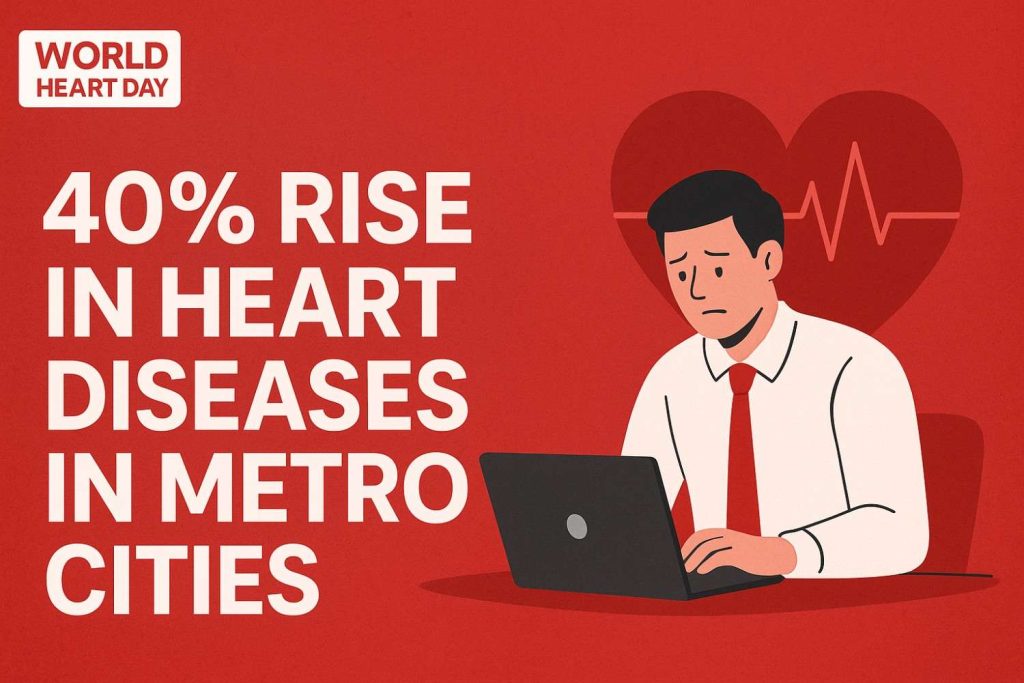40% Rise in Heart Diseases in India’s Metro Cities: Experts Call for Urgent Lifestyle and Workplace Changes
September 29, observed globally as World Heart Day, serves as a reminder of the importance of cardiovascular health. In India’s metro cities, this year’s awareness campaigns have highlighted a troubling trend: a 40% rise in heart disease cases among professionals in the last three years, driven largely by sedentary office lifestyles, poor diets and stress.

According to Ekincare’s “The India Inc Heart Index: Risks and Action” report (September 2025), the surge in cardiovascular disease in India is most visible among corporate employees in Delhi, Mumbai, Bengaluru, Chennai and Hyderabad.
Dr. Noel Coutinho, co-founder of Ekincare, explained that “heart health isn’t just a personal responsibility, it’s a prerequisite for a productive workforce.” Since employees spend most of their waking hours at the office, workplace culture has a direct impact on heart health risks in urban India.
Why Heart Disease is Rising in India’s Metro Cities
The report revealed that 65% of employees engage in less than 30 minutes of daily physical activity, putting them at high risk of heart attacks, hypertension and obesity.
Key reasons for this worrying trend include:
- Sedentary desk jobs and long working hours
- Unhealthy eating habits in office cafeterias
- Stress and poor sleep patterns in metro lifestyles
Experts warn that without urgent changes, heart disease will continue to be the leading cause of death in India, especially in urban centres.
Expert Recommendations for Employees
1. Increase Daily Physical Activity: Dr. Rahul Mehrotra, Chief, Clinical Cardiology at Artemis Hospitals, emphasized the importance of 30 minutes of exercise a day to reduce heart disease risk. He suggests:
- Brisk walking during office breaks
- Stretching or light workouts at the desk
- Taking stairs instead of elevators
He explained that lack of exercise leads to obesity, high blood pressure, and early heart risks—all of which are rising in Indian cities.
2. Adopt a Heart-Healthy Diet:Office cafeterias often serve junk food like fried snacks, cheese sandwiches, and sugary drinks. Dr. Mehrotra advises employees to:
- Replace junk food with nuts, fruits, and salads
- Stay hydrated with water instead of energy drinks
- Reduce caffeine and processed snacks
3. Prioritize Quality Sleep: Chronic sleep deprivation is another growing health issue in metro cities. Doctors recommend 7–8 hours of quality sleep to allow the body and heart to recover.
How Workplaces Can Prevent Heart Disease
Dr. Shreyas Kathrani, Head of Physiotherapy at Jaslok Hospital, stressed that companies must take responsibility for employees’ corporate health and wellness. Practical solutions include:
- Providing standing desks and encouraging walk-and-talk meetings
- Scheduling short activity breaks every hour to reduce sedentary behaviour
- Offering healthy food options in cafeterias and hydration stations
- Launching workplace wellness programs like yoga sessions, cardio challenges, or fitness competitions
- Conducting annual health screenings and using digital health apps for fitness reminders
Such measures not only improve employee health but also reduce absenteeism, low productivity, and rising healthcare costs in metro companies.
Corporate Lifestyle and India’s Heart Health Crisis
The 40% surge in heart disease in metro cities highlights how urban lifestyle diseases in India are now a national concern. Experts believe that combating cardiovascular disease among office workers requires a joint effort between individuals and organizations.
By fostering a culture of fitness and preventive healthcare, companies can ensure that their workforce stays healthier and more productive, while employees can safeguard their own long-term well-being.
Conclusion
The sharp rise in heart diseases in India’s metro cities is a wake-up call for both employees and organisations. While individuals can improve their health by exercising, eating better, and sleeping well, corporate offices must implement workplace wellness initiatives to reduce risks.
On this World Heart Day 2025, let’s remember: a strong workforce starts with a healthy heart. The battle against cardiovascular disease in India’s cities depends on collective action—both at the personal and organisational level.
Note to readers:This article is for informational purposes only and should not replace medical advice. Always consult a qualified healthcare professional for diagnosis and treatment.






























